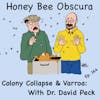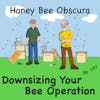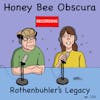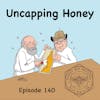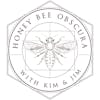Prepping for Fall and Winter (143)

What do you do when the honey is all harvested, but it is still warm and not quite time to button up the colonies for Winter? On today's episode of Honey Bee Obscura, Jim has invited Beekeeping Today Podcast's Jeff Ott, in to discuss what he does to...
 What do you do when the honey is all harvested, but it is still warm and not quite time to button up the colonies for Winter? On today's episode of Honey Bee Obscura, Jim has invited Beekeeping Today Podcast's Jeff Ott, in to discuss what he does to prepare the bees for Fall.
What do you do when the honey is all harvested, but it is still warm and not quite time to button up the colonies for Winter? On today's episode of Honey Bee Obscura, Jim has invited Beekeeping Today Podcast's Jeff Ott, in to discuss what he does to prepare the bees for Fall.
There are many different things a beekeeper could do, such as extracting the honey they've harvested, maybe clean some old equipment, check on feed levels, and feed if necessary, are just a few.
Is there any one thing a beekeeper consider this time of year? Listen in as Jim and his guest discuss this time of year that is often overlooked!
______________________
Thanks to Betterbee for sponsoring today's episode. Betterbee’s mission is to support every beekeeper with excellent customer  service, continued education and quality equipment. From their colorful and informative catalog to their support of beekeeper educational activities, including this podcast series, Betterbee truly is Beekeepers Serving Beekeepers. See for yourself at www.betterbee.com
service, continued education and quality equipment. From their colorful and informative catalog to their support of beekeeper educational activities, including this podcast series, Betterbee truly is Beekeepers Serving Beekeepers. See for yourself at www.betterbee.com
______________________
Honey Bee Obscura is brought to you by Growing Planet Media, LLC, the home of Beekeeping Today Podcast.
Music: Heart & Soul by Gyom, All We Know by Midway Music, original guitar music by Jeffrey Ott
Copyright © 2023 by Growing Planet Media, LLC

Episode 143 – Prepping For Fall
Jim: Podcast listeners, it has been thunderstorming and raining for the last couple of days over four inches. It's not a record breaker, but it makes for tough beekeeping and bee monitoring. It's fall of the year, early fall, late summer. I'm sitting here wondering as it rains, is this going to help me or hurt me? I've got my good friend Jeff here. We want to talk for a few minutes about the whole process of the pre-summer/fall management. What am I doing? What should I be doing? Those are your questions, Jeff. Take it for just a minute.
Jeff: [laughs] Well, Jim, thanks for inviting me to the show today. Yes, this is often an overlooked time of the year for many beekeepers, but it's become very important. It can seem like a boring time, but like I said, it should be very important before you start all your winter preps, but after summer, you have all of your honey off. What's a beekeeper to do? Go on vacation?
Jim: You took the word right out of my mouth, boring. Should you have used the word boring? Should I have used the word boring while we're setting up our podcast? This is a strange time, isn't it? There's nothing blooming all that much. Let's talk about it for a few minutes, if you will. Hi, I'm Jim Tew.
Jeff: I'm Jeff Ott from Beekeeping Today Podcast.
Jim: We're wondering if we can come up with some ideas on how to do something to help our bees in this late summer, early fall season that will help them survive the winter.
Introduction: You are listening to Honey Bee Obscura brought to you by Growing Planet Media, the folks behind Beekeeping Today Podcast. Each week on Honey Bee Obscura, hosts Kim Flottum and Jim Tew explore the complexities, the beauty, the fun, and the challenges of managing honeybees in today's world. Get ready for an engaging discussion to delight and inform all beekeepers. If you're a long-timer or just starting out, sit back and enjoy the next several minutes as Kim and Jim explore all things honeybees.
Jim: Jeff, I really don't have a list. There is no standard list, is there? What do you do between seasons would basically be the topic. This is the very end of summer, the very beginning of fall, so we've got a lot of opportunities for doing good things for the fall season and we've got some closing windows for doing things we should have done for the spring summer season.
Jeff: [laughs] I'll use a phrase of our friend Kim Flottum. It depends, Jim.
[laughter]
Jim: That's true. It does depend. Every time Kim says that it usually does depend on a whole list of characters. Where are you as a beekeeper? There is no standard beekeeper, is there? To a large extent, the bees are standardized. You can almost set your clock by them, but beekeepers are all over the page. It all depends, doesn't it? On where the beekeeper is and that's that.
Jeff: That's a big part of it. I think sitting here in Olympia, Washington, my end of summer, we're sitting here at the end of August, beginning of September of 2023. It's a weird time of year. As a beekeeper you're not building equipment. You're not planning expansions. You're really winding down the year. You might have honey supers in the house or in the garage or in the honey house waiting to be extracted or waiting to go into storage.
Jim: Can I name this because I feel it too, Jeff? I was going to talk about feed your bees and check the queen and that you lock down the mites but more I'm talking about my feelings. I feel this late summer letdown. The spring season of 2023 is now gone. We know what's going to happen. We know how the story ended. Just a few months ago, I was all excited. This is going to be the year. This is going to be a major crop. Oh, my stars, this is going to be best ever. No, no, no, it was just another bee year. I'd like to name this the late summer letdown.
[laughter] The reality is that this is not going to be my glorious year of all years and this was just going to be a good year. I picked up four swarms for free. I probably lost two swarms, but I don't want to talk about that. The thing is, there'll be a little bump. I'll have a little emotional bump. When goldenrod starts up, fall aster comes in and the bees begin to put up goldenrod and you get that really delectable stink that comes from that goldenrod. That'll be one final hit before the bees and I go into the long dearth.
The point is, what should we be doing right now? You've used the word dull. I've used the word boring but no, it's just the transitional change, the acceptance of the fact this spring season is over. One last two are off for the fall season and then it's time for what? To get to the big dearth and then start it all over again next spring.
Jeff: Yes. I firmly believe and I've only come to this belief through the harsh realities of life as a beekeeper that this time of year, instead of being dull, we should be laser-focused on knocking down the Varroa population. It should have started last month as soon as the honey supers are pulled, or if not before now that we can use oxalic acid vaporization or oxalic acid with the honey supers on to get the bees through the fall with the lowest Varroa population that we can, because I've learned, it's not just through reading because maybe it's just me, but when I read or when I watch someone or I hear someone say, "Well, you got to knock down Varroa." I'm sitting there thinking, "Well, not my bees. My bees are special." [laughs]
Jim: They don't know how strong your bees are right now.
Jeff: That's right.
Jim: Your bees really look good. You don't have to treat.
Jeff: I am on top of that Varroa all year round, except for now, I don't need to. I've learned harshly that that's not true and that's through colonies that die are dead by December 1. That's a harsh, harsh reality. That's not just for me, the beekeeper but what about the poor bees who just got so weak that they perished before they had a chance to get through the winter? To even embarrass myself even more, I cannot remember the last time I lost a hive due to freezing or starvation. I know all of my bees that I've lost during the winters have died because they've dwindled before the winter due to Varroa.
Jim: Either due to Varroa or the effects of Varroa. I completely agree with you. I've tried to think of ways to write articles where the beekeepers wouldn't murder me for, where I describe how to take honey off a dead bee.
[laughter] They would die with their winter stores in place and then the next spring, I've got 40, or 50, or 60 pounds of honey in deep frames on top of a dead colony.
Jeff: Absolutely. That's a horrible realization to open that hive in January and find that cluster of dead bees and a full super, a deep super full of honey above them. You know it's not due to any other disease such as American foulbrood or anything else like that. You see the deformed wing, you see the small cluster, you don't see many bees. They're all on the bottom board. It's a sad, sad mess. My belief is to take a mental shift instead of saying, "This is a boring time of year." This is the time for me to really get into gear and be laser-focused on eliminating the Varroa where I need to and that involves several steps that we can talk about.
Jim: I should be doing everything you're saying to do. As we wander away from this pity me, pity me party we went through with our bees are all dying. It's just staggering to realize that this big beautiful colony that looks so powerful and voluminous growth and flight from the entrance can be dead by the first week in January from Varroa predation or the Varroa effects of it. Every year I'm like Lucy in that football. I know those colonies died last year, but this colony is really going to be okay. These two beehives are fine. When you think, "Well, Jim, you said that about those last year, but every year it's so enticing." Leave alone, let alone kind of thing. They look good. They're strong. Why would you go in and fix them? All that spraying and oxalic acid and whatever you're going to be using or you can just sit back and let the bees take care of it. The bees don't take care of it most of the time.
Jeff: Yes, you're sitting there saying, "You know that $50 Varroa hygienic bee really did its job. [laughs] Those bees are really doing strong and they're the best. That's the best $50 I spent."
Jim: Yes. The feeling just won't go away that every year, something's different this year. These colonies are going to make it and every year then I'm taking honey off dead bees. You just have to know that I agree with you that I've done some treatments. I should do more treatments. I should go out there just like you said. I'll do the best I can but an admonishment to you and me both, we're supposed to be helping. I like the way that you said laser. We need to be very precise. Don't go out there every day and torment your beehives and pull frames out and look for queens and check whatever and somehow be laser-focused. Do what you got to do. Be in, be out, and be gone, and then let the bees be bees. I don't sense that they like us being in there. We got to control Varroa. You and I agree on that. You got to control Varroa or you got to have a bee replacement plan for next year, so is there a third option Jeff? I guess the third option would be blind luck that sometimes one of those colonies does survive, but otherwise you control Varroa or otherwise you have a bee replacement plan for next year. Probably packages or splits or whatever.
Jeff: I think that's right.
Jim: All right. How about feed stuff? You and I both agree that in recent years starving has not been an issue, but if one is producing honey and they took a lot of honey off, then maybe some colonies could be lightened up. When I fed fall feed sources you use thick syrup just as thick as you can make it, because you're feeding for food you're not feeding for stimulation. Through the years I think I've used most feeding devices, but I like Top Feeders. You can feed a lot and it's convenient to feed. Can you agree with Top Feeders or do you want Division Board Feeders or?
Jeff: It depends Jim. Being a Midwest beekeeper and Colorado beekeeper and moving into Washington, I like Top Feeders because I don't like breaking up the brew or getting down too far in the box on those days that I have a chance to feed. I just don't like doing that. I like the Top Feeders because they're quick, simple, less disruptive to the colony, but I found after several winters here in the Pacific Northwest you don't want all that moisture of wet syrup in the colony, or at least this is what I believe I've learned.
The beekeepers here in the Pacific Northwest and I'm not talking about on the east side of the cascades where it's much drier it's much like Colorado. On the west side where you get all the rain there's just too much moisture in the air for the bees to get rid of all of that to evaporate all the water that's in that wet syrup, so you either have to have a super good way of helping the bees manage all that moisture in the colonies or not feed liquid syrup. Most of the beekeepers around here are using fondant and fondant boards or candy boards that make use of the natural metabolism moisture of the winter cluster to wet and moisten the fondant or the candy board so the bees can get to it.
Winters were hard to first couple years of keeping bees here because I was in the mentality, "Okay. Well, I'll just keep adding sugar syrup to the colonies." Every year I'd say, "Why the heck are all of my bees moldy? Why is it so wet in these hives?" I attribute it to all the sugar syrup I fed.
Jim: Well, that's really, really interesting. Here in the Midwest where I am the humidity is high, but we have our days when it's low and we have our days when it's high and I've never thought about that, but I have fed and I do know commercial beekeepers across the country years ago would just feed dry sugar, pour it on the inner cover, pour it inside the colony, the bees will find it. It was rough and ready. I was listening to you talk about the moisture issue, and I really hadn't thought about that. Here in the Midwest we have humid days and we have dry days, so I can still use them, but I've fed dry sugar and I know commercial beekeepers who've just fed granulated sugar. I wonder if you could do that. I'm going to give you a minute to talk about it while we take a short break and hear from our sponsor.
Betterbee: At Betterbee we know you have many options for where you choose to get your wooden hive boxes and frames. We work closely with our sister company Humble Abodes in Maine to bring you high quality wooden wear featuring tight fit assembly available in a variety of great options to meet your needs. Whether you choose select commercial or budget grade boxes or frames, you can count on quality milling of locally sourced eastern white pine. Shop all wooden wear at betterbee.com.
Jim: Have you considered feeding dry sugar? If the humidity is that high, the sugar would be gummy anyway.
Jeff: I know some beekeepers who do use dry sugar unlike an adapted rim board with access to it as opposed to-- I've seen videos or books where they sprinkle the sugar on the top bars and I think that's a mess. I think you're just attracting vermins that way, but I've not fed dry sugar and I can't put a finger on it, but something about that does not appeal to me. Although it would be a lot simpler than making candy boards or dealing with fondant or even buying fondant.
Jim: There's only a fine line between efficient beekeeping and messy beekeeping.
[laughter] It's a very fine line. When are you efficient and when am I just sloppy?
Jeff: I think it's more like a very big gray area. [laughs]
Jim: I know exactly what you're talking about. To go out and and dump three pounds of sugar on a rim board and think you've done your bees a good service, but alternatively if the bees take it, and the colonies personalities are different. Some colonies will go up and line up and take that granulated sugar like chickens in a feeder, and other bees sometimes they actually throw part of it out, carry it out and dump it. Well? How about the queen, Jeff? I'm going to say boldly that the queen you got is the queen you're stuck with. At this time of the year if you've got a queen that you really don't care for it's just too late to put another 35, $45 queen in a hive and give her a chance to become established, get a brood nest and get through the winter. Shoot a hole in that, I'll always say.
Jeff: I don't think I will even attempt. I'm very hesitant to requeen in the fall. I know that's a practice for many beekeepers, but I imagine that depending on the part of the country you're in winters are different and may be successful, but anywhere here and wherever I've kept bees I would just wish that colony good luck. If they have a queen that they make it through the winter. If she dies during the winter, there's still time. You're not going to lose necessarily the colony through the winter because the queen dies, but that gives you time in the spring, early spring, late winter to requeen at that point or as soon as you can.
In an emergency situation if she was just pathetic, well, it's hard to tell this time of year, because the queens aren't laying that much anyways, so if she was to die, if you accidentally pinch her or roll her in between frames and I've never done that.
Jim: Oh yes, right. I've never stepped on my own queen. No. [laughs]
Jeff: Yes. Who has really. If it was a smaller colony maybe combine it with another colony or in the worst case maybe if I had a frame it had eggs or very, very day old larvae maybe put that into that, but even then she's not going to mate. If you lose a queen this time of year I think your SOL best bet is to combine that colony, and I definitely would not try requeening.
Jim: Well, we're on board with that. No controversy, no argument. Take your losses in the fall. All right? Because just like you say, cut your losses and it's hard to-- You know what? All my life numbers were important. Then even in my old age now I consider numbers, but I used to be, "I want 100 hives, I want 500 hives." "How many hives do you have?" "I have 48." "How many hives do you have?" I've got 16." "Well, I'm a much better beekeeper than you then." We all give these numerical ranks, but there's no glory, and going into winter with weak colonies just for a colony count, for a hive count, you combine them, get those colonies through as strong as possible in the next spring go out there and torment your beehives and split them out again. The numbers are irrelevant compared to overwintering success.
Jeff: Yes. I think that's what this time of year is best for is prepping your bees to be the strongest they can going into the winter so they can come out of the winter at the highest population possible so you can have a successful next year.
Jim: This is our opening, this is our portal for the last hoorah of this season. Maybe we'll talk about that sometime, but this is the doldrums of summer getting ready for the next big final hoorah . Would you categorize it that way?
Jeff: Yes, I would, and take advantage of that down period to really make the most to help your bees. I'm just speaking from my own personal experience, don't wait till October to try to get your bees ready for winter, because you're too late.
Jim: I'm going to leave it that way. I can't word it any better.
[laughter] Until Kim's back, until you and I talk again I hope everybody has a good fall flow and bees are healthy, and you and I are both happy the next time we get together.
Jeff: It's going to be a good fall. Thanks for inviting me.
Jim: Oh, I wouldn't miss it. I enjoy talking to you.
[00:19:08] [END OF AUDIO]
New to Honey Bee Obscura Podcast?
Here are some great episodes to start with. Or, check out episodes by topic.










